Night Train to Munich Blu-ray Movie
HomeNight Train to Munich Blu-ray Movie 
Criterion | 1940 | 95 min | Not rated | Sep 06, 2016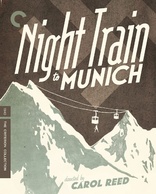
Movie rating
7.1 | / 10 |
Blu-ray rating
| Users | 3.5 | |
| Reviewer | 3.5 | |
| Overall | 3.5 |
Overview
Night Train to Munich (1940)
A British agent masquerades as a Nazi officer to protect an inventor and his daughter.
Starring: Margaret Lockwood, Rex Harrison, Paul Henreid, Basil Radford, Naunton WayneDirector: Carol Reed
| War | Uncertain |
| Thriller | Uncertain |
Specifications
Video
Video codec: MPEG-4 AVC
Video resolution: 1080p
Aspect ratio: 1.34:1
Original aspect ratio: 1.37:1
Audio
English: LPCM Mono (48kHz, 24-bit)
Subtitles
English SDH
Discs
Blu-ray Disc
Single disc (1 BD)
Playback
Region A (locked)
Review
Rating summary
| Movie | 3.0 | |
| Video | 4.5 | |
| Audio | 4.5 | |
| Extras | 2.0 | |
| Overall | 3.5 |
Night Train to Munich Blu-ray Movie Review
Reviewed by Dr. Svet Atanasov July 29, 2016Carol Reed's "Night Train to Munich" (1940) arrives on Blu-ray courtesy of Criterion. The only bonus feature on the disc is an archival filmed conversation between film historians Bruce Babington and Peter Evans. The release also arrives with an illustrated leaflet featuring an essay by film critic Philip Kemp. In English, with optional English SDH subtitles for the main feature. Region-A "locked".
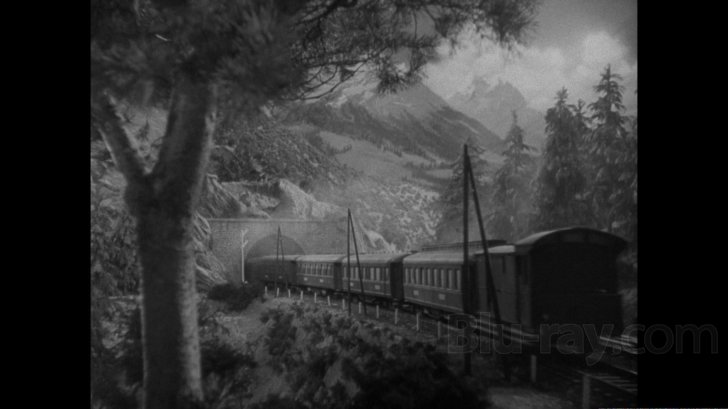
The Train
The truth is that Carol Reed’s Night Train to Munich really does rehash a lot of what made Alfred Hitchcock’s The Lady Vanishes special. This is hardly surprising as the same pair of writers that produced the script for Hitchcock’s film, Frank Launder and Sidney Gilliat, also delivered the script for Reed’s film. I’ve seen people group them together and argue that Reed’s film is a loose sequel to Hitchock’s film, but this is a tricky theory to defend.
The film begins in Czechoslovakia, moments before it becomes crystal clear that the Nazis have invaded the country. Army inventor Dr. Axel Bomasch (James Harcourt, Hobson's Choice) flees to England, but his daughter Anna (Margaret Lockwood, Cast a Dark Shadow) is arrested by the Nazis and sent to a concentration camp. There she is approached by Karl Marsen (Paul Henreid, Casablanca), a double agent, who helps her escape the camp and then promptly delivers her and Dr. Bomasch to Gestapo.
Shortly after the news that Dr. Bomasch has been captured reaches London, agent Gus Bennett (Rex Harrison, Cleopatra) is ordered to go to Germany and help the Czechs escape. Bennett, who speaks fluent German, will act as a top military inspector who can influence his foreign ‘lover’ Anna to convince Dr. Bomasch to work for the Nazis.
For a while the plan works as intended, but when Marsen decides to escort the ‘inspector’, his ‘lover’ and her father to Munich and accidentally discovers that the ‘inspector’ is actually a British agent, everyone is forced to begin improvising.
The film is charming and at times genuinely entertaining, but it is utterly ridiculous. Indeed, it blends suspense and comedy in a manner that quickly and very effectively neutralizes its intent to appear authentic. By the time Harrison introduces himself as a military inspector and begins uttering his lines with a truly awful German accent, the archival footage that is used in the first act already makes little sense and the entire thing looks like a big farce.
What partially redeems the film are some of the individual performances. For example, the two colorful cricket fans from Lady Vanishes, Caldicott (Naunton Wayne, The Titfield Thunderbolt) and Charters (Basil Radford, Whisky Galore!), pop up in the middle of the film completely unaware that Germany has started a new war and immediately delight with their antics. Henreid is also very good as the mean Gestapo officer, though during the big shootout at the end he is quickly transformed into a conventional loser.
Cinematographer Jack Cox’s lensing and the period costumes and decors are quite good, but there are segments where it feels like more could have been done to make the film look more attractive.
In 1940, Night Train to Munich earned an Oscar nomination for Best Writing, Original Story (Gordon Wellesley).
Night Train to Munich Blu-ray Movie, Video Quality 
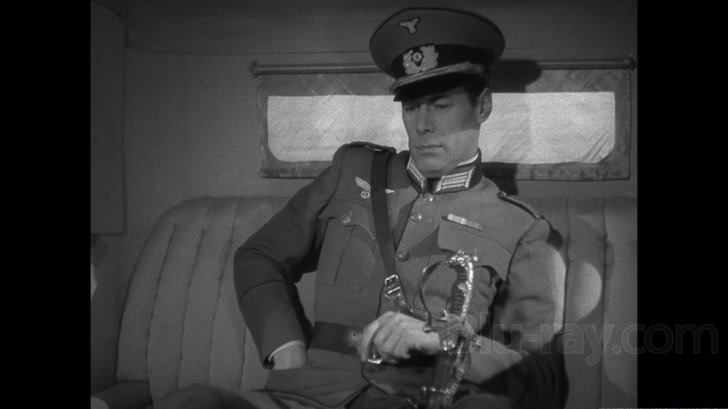
Presented in an aspect ratio of 1.34:1, encoded with MPEG-4 AVC and granted a 1080p transfer, Carol Reed's Night Train to Munich arrives on Blu-ray courtesy of Criterion.
The following text appears inside the leaflet provided with this Blu-ray release:
"This high-definition digital transfer was created on a Spirit 2K DataCine from a 35mm duplicate negative. Thousands of instances of dirt, debris, scratches, splices, warps, jitter, and flicker were manually removed using MTI's DRS and the Pixel Farm's PFClean, while Digital Vision's Phoenix was used for small dirt, grain, and noise management.
Transfer supervisor: Maria Palazzola.
Colorist: Gregg Garvin/Modern VideoFilm, Los Angeles."
Elucidating a few very small shaky transitions -- and obviously the bits of documentary footage that exhibit different density and show some light damage (see screencapture #16) -- the film's overall appearance is quite nice. Indeed, the visuals are well balanced and depth is consistently very good. In fact, even during the darker/nighttime footage depth and fluidity remain very convincing (see screencaptures #14 and 15). Grain is healthy and well distributed. Contrast and brightness levels are stable. There are no traces of compromising sharpening adjustments or other digital enhancements that impact the integrity of the film. A few tiny scratches remain, but it is very easy to tell that debris, damage marks, stains, and other age-related imperfections have been removed as best as possible. Ultimately, this is a strong presentation of Night Train to Munich which offers solid upgrades in all key areas we address when older films transition to Blu-ray. (Note: This is a Region-A "locked" Blu-ray release. Therefore, you must have a native Region-A or Region-Free player in order to access its content).
Night Train to Munich Blu-ray Movie, Audio Quality 
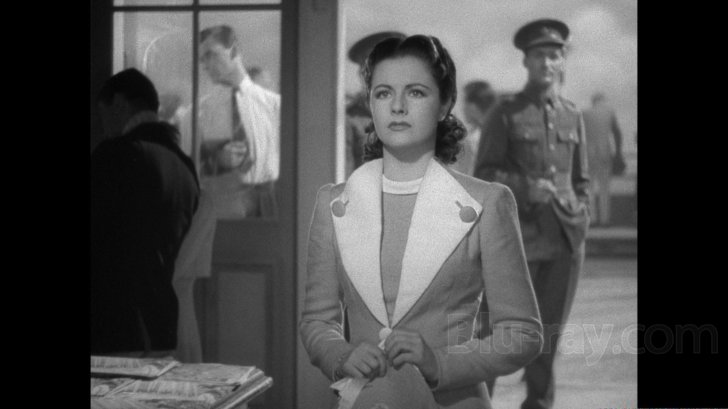
There is only one standard audio track on this Blu-ray release: English LPCM 1.0. Optional English SDH subtitles are provided for the main feature.
Depth is modest but clarity is very good. There are a couple of segments where a slight 'thinning' is noticeable in the mid/high register, but there are no distracting distortions. The dialog is stable, clean, and very easy to follow. Also, there are no pops, cracks, or audio dropouts.
Night Train to Munich Blu-ray Movie, Special Features and Extras 
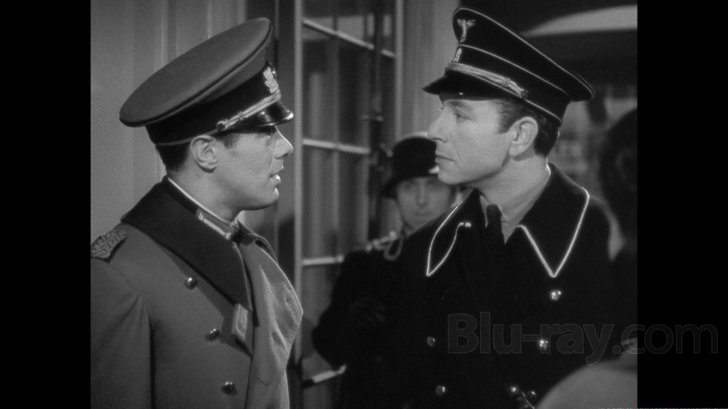
- Bruce Babington and Peter Evans - in this archival video interview, Bruce Babington, author of Launder and Gilliat, and Peter Evans, author of Carol Reed, discuss the production history of Night Train to Munich and the socio-political environment in which the film emerged. The interview was conducted exclusively for Criterion in 2010. In English, not subtitled. (30 min, 1080i).
- Leaflet - an illustrated leaflet featuring an essay by film critic Philip Kemp.
Night Train to Munich Blu-ray Movie, Overall Score and Recommendation 
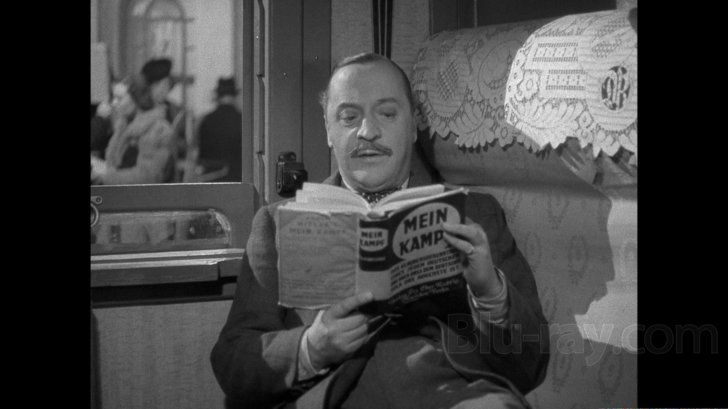
It is impossible not to compare Carol Reed's Night Train to Munich to Alfred Hitchcock's The Lady Vanishes and Ernst Lubitsch's To Be or Not to Be and the truth is that both of these films are vastly superior. Some of the individual performances in Reed's film are quite wonderful, but the end result is somewhat underwhelming. If you have already seen Night Train to Munich and liked it, you will be pleased to know that it looks wonderful in high-definition. The only bonus feature on this upcoming Blu-ray release, however, is an archival conversation between film historians Bruce Babington and Peter Evans. RECOMMENDED when it goes on sale.
Similar titles
Similar titles you might also like

Last Embrace 4K
Standard Edition
1979

The 39 Steps
1935

Farewell
L'affaire Farewell
2009

Topaz 4K
1969

Spies
Spione
1928

Five Graves to Cairo
1943

Agent 8 3/4
Hot Enough for June
1964

Trans-Europ Express
1967

Billion Dollar Brain
1967

The Taking of Tiger Mountain
Zhì qu weihu shan / 智取威虎山
2014

Cloak and Dagger
1946

Wake in Fright
1971

The Ones Below
2015

Enigma
1982

Never Look Away
Werk ohne Autor
2018

The Day of the Jackal
1973

Man with a Movie Camera
Человек с киноаппаратом / Chelovek s kino-apparatom
1929

Went the Day Well?
48 Hours
1942

The Lady Vanishes
1938

Pickup on South Street
1953